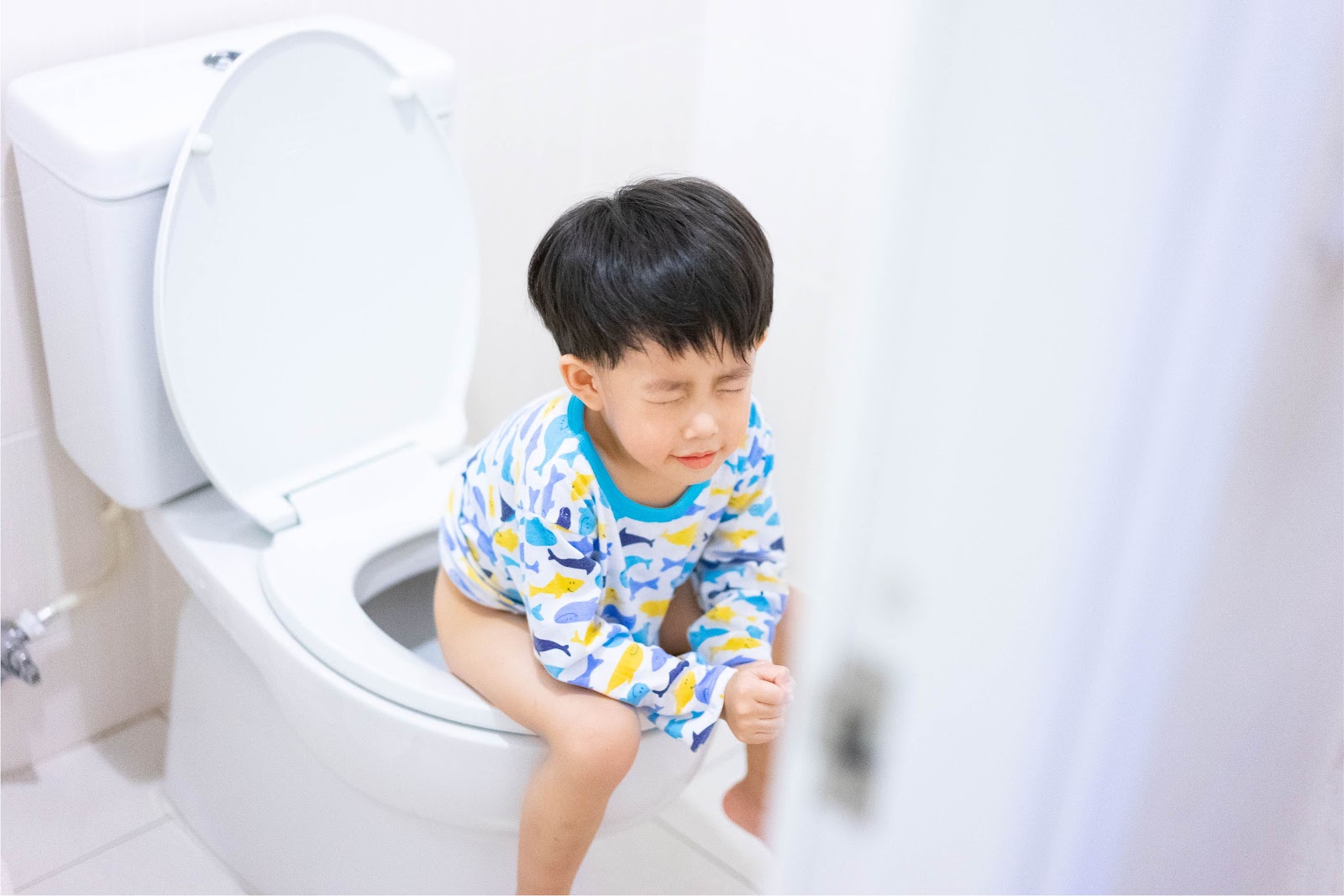 English
EnglishThe harmful effects of constipation on the development of children
Constipation in children is a major health problem worldwide, with a global prevalence of 9.5%. Constipation accounts for 3% of visits to primary care physicians and up to 25% of referrals to pediatric gastroenterologists. Children with constipation incur three times more health care costs than those without constipation. In addition to affecting daily activities, constipation also carries the risk of leaving digestive complications, affecting nutrient absorption, and development in children.
Constipation is a condition of infrequent bowel movements (≤2 times per week) accompanied by fecal impaction and may cause pain during defecation or fecal incontinence and fecal incontinence (involuntary defecation).
Constipation in children is divided into two main types: organic constipation and functional constipation. Of which, functional constipation is a common constipation condition in children, accounting for 95%. Functional constipation is a condition in which children have difficulty defecating due to reasons other than organic causes. Functional constipation is a common problem in children with an estimated prevalence of 3% worldwide, of which 17 – 40% of children suffer from constipation in the first years of life, especially common in preschool children.

Stimulation photo of constipation in children
1. The harmful effects of constipation on the development of children
Constipation, if not treated early and properly, will affect the health and development of children.
– Slow development and malnutrition
When constipated, feces accumulate in the child’s digestive tract, unable to escape, causing bloating, flatulence, leading to the loss of appetite, anorexia, indigestion, and gradually anorexia and poor absorption. Therefore, children are at high risk of malnutrition, affecting their physical and intellectual development.
– Increased risk of digestive diseases
Most children with constipation are at high risk of gastrointestinal diseases such as enteritis, digestive disorders, and intestinal motility disorders,…
– Increased risk of anal and rectal diseases
Children with constipation, when defecating, have to strain, increasing pressure on the veins in the anal rectum, causing hemorrhoids. The solid stool rubbing against the anus when defecating is the main cause of anal fissures and bleeding. Stool accumulated for a long time creates a favorable environment for harmful bacteria to grow, increasing the risk of infection and itching in the anal and rectal areas.
– Affects mental development in children
When constipated, the body reabsorbs toxins causing neurotoxicity such as headaches, insomnia, restlessness, and crying, affecting the child’s mental development.

Prolonged constipation affects children’s health, physical and mental health.
2. Treat constipation, limit the negative effects of constipation on children’s development
If your child is constipated, parents should first prioritize adjusting his or her diet and lifestyle habits. In the vast majority of cases of mild or acute constipation, this condition will be significantly reduced or improved if parents intervene promptly.
– Maintain a scientific diet, rich in fiber, good for digestion
+ For infants with direct breastfeeding, it’s suggested that the mother’s diet should be changed. Mothers should limit spicy foods and add more fiber to their diet. Changing the mother’s diet can provide more beneficial nutrients in milk, thereby stimulating the baby’s intestinal motility.
+ For older children who eat rice and porridge, it is necessary to supplement enough fiber in their daily diet. Green vegetables such as sweet potato leaves, Malabar spinach, and ripe fruits are foods that contain a lot of fiber. If children do not eat vegetables and fruits, parents can supplement their children with fiber through smoothies made from vegetables and fruits.

Adding fiber to your child’s daily diet helps prevent constipation effectively.
– In addition to the daily diet, parents should supplement beneficial substances for the digestive tract to stabilize the intestines and reduce constipation in children.
Supplementing probiotics, micronutrients, and beneficial minerals such as zinc, amino acids, lysine, taurine, vitamins B6, B12, and probiotics allows children to have a healthy digestive system, restore the balance of intestinal microflora, stabilize the digestive tract, and reduce constipation.
Scientific studies show that Postbiotics not only help balance the intestinal microflora but also enhance the ability to absorb nutrients and protect the intestinal mucosa from harmful agents. When the microflora is balanced, intestinal motility works more effectively, thereby reducing constipation. Postbiotic technology is becoming a breakthrough in supporting children’s digestive health. Understanding that, Nutricare scientists and the Nutricare Medical Nutrition Institute – USA (NMNI-USA) have pioneered research and breakthrough application of Postbiotics technology and successfully developed the nutritional product Metacare Opti. Metacare Opti provides 30 billion probiotics (Postbiotic LBiome and Postbiotic L. Lactis Plasma probiotics) that adhere to the intestinal wall, enabling inhibitation of harmful bacteria growth, supporting the natural immune system, thereby supporting the body against the invasion of harmful bacteria, balancing the intestinal microbiota. Metacare Opti is clinically proven to help 83.3% of children using milk have a stable digestive system, reducing the rate of constipation by 20% and reducing the rate of diarrhea by 28.3%. At the same time, the product contains HMO combined with fiber, supporting a healthy digestive system for children, preventing constipation, and supporting the balance of intestinal microbiota.
– Drinking enough water reduces constipation. The amount of water needed is adjusted to suit the age and medical condition of the child
The common cause of long-term constipation in children is lack of water. Especially for children over 1 year old who are switching from drinking milk and eating baby cereal to solid foods that lack water. Therefore, it is necessary to give children enough water every day to make it easier for them to defecate. The World Health Organization recommends: children under 6 months of breastfeeding do not need to drink water at all, but if the child is constipated, they should still drink 100 – 200ml of water/day.
For children starting to eat solid foods from 6 to 12 months, drink 200 – 300ml of water/day.
Children 1 – 3 years old drink 500 – 600ml of water/day.
Children 3 – 5 years old drink 1000ml of water/day.
Children over 10 years old drink the same as adults: 1500 – 2000ml of water/day.

Drinking enough water reduces the risk of constipation in children.
– Encourage regular exercise
Parents should encourage their children to exercise more by letting them participate in games or exercise, and sports. Exercise habits not only improve physical strength and increase the development of children, but also stimulate the abdominal and anal muscles to move better, improving constipation.
In addition, parents can train their children to defecate regularly to eliminate the habit of holding in their bowel movements. Instruct children to keep their legs and feet comfortable, take deep breaths, and hold their breath while pushing, and praise them when they do well to encourage and help them remember. When children are constipated, parents should massage their children’s abdomen from right to left in a clockwise direction, 3-4 times a day between meals.
Proactively preventing constipation is the best way to prevent complications and consequences of constipation so as not to affect children’s development.
